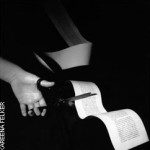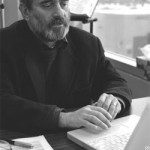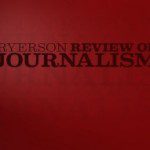Army of One
After being captured and tortured for five days in Iraq last fall, Scott Taylor returned to Canada, his military magazine, Esprit de Corps, and an uncertain future. He wouldn't have it any other way
After Scott Taylor finished picking at what he believed was his last meal, a young Arab came into the room. He grinned as he said, “I am the lucky one who has been chosen to kill you, American dog.”
“I want you to teach me an Islamic prayer before you kill me,” said Taylor, a Canadian author and publisher of Esprit de Corps, a military magazine. “A man about to die should have a God to pray to, shouldn’t he?”
As the guards explained the conversion process, a cleric returned to the house and told Taylor he would be taken to a safe house before being freed. This wasn’t the first time he’d been promised freedom. Again, he entertained the possibility he might survive. As before, his captors took him to another house, where his ordeal continued.
Taylor’s plight began on September 7, 2004, after he and Turkishjournalist Zeynep Tugrul took a taxi to Tal Afar, a northwestern Iraq city rumoured to be the target of an imminent U.S. attack. Upon reaching a checkpoint outside the city, Taylor asked some Iraqi policemen for help finding his contact. They directed the journalists to a car with four masked gunmen, which Taylor mistook for Iraqi Special Forces. They drove to a small courtyard in the city and a metal door shut behind them. The leader, or emir, said, “You are spies, and now you are prisoners.”
Taylor and Tugrul were stripped of their belongings and moved to a second house, where Taylor was interrogated and then told to sleep while his identity was confirmed. “If you are telling the truth,” said the emir, “we will release you. If not, you die.”
In the morning, Taylor’s captors kicked him awake. He and Tugrul were taken to a third house, where they ate flatbread and fried eggs. The leader returned that night and, after saying their stories checked out, promised they’d go free. But after midnight, American Apache helicopters assaulted the city and a Predator missile killed the emir and destroyed his Land Cruiser. The next morning, the surviving captors took Taylor and Tugrul to a fourth house. They blindfolded Taylor and hit him until a guard with a brother in Canada intervened. Then they were taken to yet another house outside Mosul, where they and another captive, a UNICEF driver, were told they would be beheaded.
“How long do you think the pain will last?” asked the driver.
“About three seconds,” Taylor said.
At this time, the brother of the dead emir stepped in to save him, but then a new group of militants gagged Taylor and blindfolded him. They set him on his back, bound his ankles to a pole above him, and beat his legs with straps and batons. Throughout the kidnapping, Taylor’s captors juxtaposed torture with Middle Eastern hospitality – they gave him first dibs on the chicken and pulled up his blanket to keep him warm.
After Tugrul’s release, Taylor spent Sept. 11, 2004 handcuffed and chained to a bed watching the third anniversary of the World Trade Center attacks on TV. Later, as he answered more questions, his interrogator said, “Stop. Get your things. You will live. You are free.”
Taylor’s captors drove him to a Mosul highway and waved down a taxi. One guard tore the tape from his eyes, put the dinar equivalent of US$7 into his pocket, and pushed him into the car. Taylor finally realized he was free when he smelled beer on the driver’s breath.
Upon returning to Canada, Taylor found something positive in the experience: “After all,” he said, “aside from everything else, I didn’t have to pay for transportation, hotels, or food during my entire Iraqi vacation.”
As one of 22 journalists kidnapped in Iraq during 2004 – one, Italian freelancer Enzo Baldoni, was killed – Taylor suddenly became a celebrity. A woman kissed him at a bus stop, and when his hockey team went to Barbarella’s, an Ottawa strip club, some of the dancers recognized him and cried – they’d been worried about him. “Unfortunately,” said Taylor in a deadpan manner, “I couldn’t parlay that into free lap dances.”
At least, that’s the way Taylor tells his tale. Not everyone is buying it. Some journalists and soldiers find his claims dubious, while others praise him as a passionate, independent reporter. Some decry his self-appointed quest to clean up the armed forces; others praise his investigative work. Taylor defends his reporting: “If they’re questioning my authenticity, they haven’t read me. It’s all there. Every source is credited,” he says. “I write what I see and I write what happens to me.”
“Hard time?” says Taylor. “I don’t think so. They don’t host you at a luncheon if they’re going to give you a hard time. I’m a national hero.”
Taylor wears a jacket without a tie and, as usual, leaves the top two buttons undone. Later, he dismisses the possibility his casual attire might have offended his hosts. “After a few bottles of Turkish wine, we were sitting around in our undershirts drinking coffee.”
Taylor’s penchant for hyperbole is built into his character. The 44-year-old quotes from The Simpsons, and smirks, but doesn’t smile. “Every day’s a new adventure,” he says, “because it wasn’t part of a charted course.” Once a runner, he now cycles because his knees can’t take the stress. Since the kidnapping, he toasts with friends and family by saying, “To life,” or its Serbian equivalent, “Ziveli.”
Taylor grew up in the Toronto suburb of Scarborough, and would often paint with his father, a professional artist. He studied at the Ontario College of Art with his girlfriend, Katherine, and married her after graduation (they have a 10-year-old son). When a 1982 trip to Bolivia fell through, Taylor served three years in the army, both for the challenge and the adventure. In 1989, he published his own magazine for the same reasons.
Esprit de Corps is a mom-and-pop operation that covers the Canadian military with an emphasis on news, commentary, and history. Taylor is publisher, editor, and reporter. Katherine, a freelance illustrator, handles graphics and advertising. Only the Taylors, an office manager, an administrative assistant, and an intern are paid; the rest of the staff, many of them military veterans, are volunteers. The office, just east of Ottawa’s Chinatown, has a coffee machine labeled “The Gurgling Sloth,” a defused grenade on a shelf, and a whiteboard calendar kept in military time. The walls of Taylor’s office are covered in framed clippings about the magazine. His shelves hold foreign translations of his books, model soldiers in formation, and a dinged-up rocket casing he acquired when bicycling in Macedonia while gunships fired overhead.
Early issues of Esprit de Corps were glossy, colourful, bilingual, and were carried on Canadian Air Force flights. The quarterly was funded primarily with advertising from military contractors, and the Department of National Defense vetted each article. Back then it was an in-flight military publication with a mix of entertainment and news. That changed in 1991 when Esprit de Corps became a paid-circulation independent monthly. The June issue was pulled from military flights when Taylor took his first real shot at the military by accusing it of censorship. In 1994, after receiving a videotape depicting Canadian soldiers hazing a Somalian boy, Taylor wrote about it in Esprit de Corps and passed the tape to the mainstream media. The Somalia scandal exploded. In the fallout, the DND disbanded the Canadian Airborne Regiment, and people blamed Taylor. Most of Esprit de Corps’s advertisers pulled out – General Motors, for example, cancelled a $50,000 contract.
But Taylor continued to pursue stories critical of the military. The magazine reported that seven soldiers in the Royal 22nd Regiment (VanDoos) were charged in three separate murders over a two-year period. In his first book, Tarnished Brass, Taylor criticized military higher-ups for attending an annual Florida junket named Operation Palm Tree while expecting soldiers to use food banks. According to Taylor, the magazine broke stories that changed the military’s structure and justice system. “I believed in that institution and I still do,” Taylor says. “But it needs to be challenged for it to work.” In 1996, he won the Windsor Press Club’s Quill Award for outstanding work in Canadian communications and the Mackenzie Institute’s Alexander Mackenzie Award for journalistic excellence.
Despite his history of defending the rank and file, Taylor doesn’t seem to enjoy unanimous support from the soldiers. In a letter to the editor printed in the May 2001 issue of Esprit de Corps, a reservist named Greg Bullivant wrote: “Mr. Taylor, it is my belief that you maintain a fair bit of responsibility for the absolute carnage that is now the Canadian Armed Forces.” And last November Taylor’s speech at a Rotary Club’s fundraiser in the army town of Petawawa was cancelled due to low ticket sales. Few soldiers are prepared to speak on the record. However, some commented anonymously about Taylor and his kidnapping on an Internet message board for members of the Canadian Armed Forces. While some defended Taylor, most posted criticisms such as: “The public doesn’t have to go looking for Scott Taylor; he comes looking for us”; “He’s like an action hero. It must be all that reading he does about ‘special forces.’ That or Playstation”; and “Watch for the new book, he’s probably polishing it for the publisher right now.”
Soldiers aren’t alone in questioning Esprit de Corps’s relevance. Some military reporters, including Stephen Thorne of the Canadian Press and Sharon Hobson of Jane’s Defense Weekly, declined to speak about Taylor or Esprit de Corps, but Chris Wattie, a senior national reporter for the National Post who specializes in military affairs, says, “What Scott did in the mid-1990s was important. It needed to be done, and he was almost the only person doing it. But the field has grown beyond him, and he hasn’t moved on with the field.”
Now, more reporters, such as The Toronto Star‘s Bruce Campion-Smith, cover the Canadian military with greater regularity. The increased coverage focuses on equipment shortages and the day-to-day activities of soldiers. Moreover, the DND has changed its practices and hired an ombudsperson, for which Taylor takes partial credit, and there now seems to be less corruption to expose. When Somalia became a scandal, it wasn’t only about the crimes committed – the attempted cover-up was a story in itself. The department now deals more openly with such incidents, like the friendly fire killing of four Canadians in Afghanistan in 2002. But Taylor is unimpressed. He says the DND is just better at covering its tracks.
That cynicism isn’t shared by everyone on the beat. Wattie, who respects Taylor, admits tentatively, “He was in the army at a time when it had really lost its way, and that has coloured his view.” In response, Taylor says he wasn’t exposed to corruption during his time in the military. “We didn’t discover the corruption until well into the magazine.”
Despite the quips, money is always a problem for Taylor – Esprit de Corps’s circulation has declined from about 30,000 in 1994 to 10,000 today. Taylor and his wife, who haven’t had a car in two years, each bring home a small salary – he had more disposable cash as a waiter in college. Taylor created Esprit de Corps Books in 2002 to make some more; now the company’s profits keep the magazine alive. “He’s passionate about these subjects and wants to get attention on them,” says David Pugliese, a defence reporter for the Ottawa Citizen, and the author of two books published by Taylor. “That comes, unfortunately, to the detriment of his family’s financial security.” Taylor says, “It’s all in the choices we make, right? And we’ve made those choices with a clear conscience. Once you’re committed, you’re committed.”
Taylor returns to the office after the launch. “If we cover the cost of the van for the day,” he says, “we’re laughing.” Louise Richard, a Gulf War veteran who volunteered at the launch, tallies the day’s sales: Spinning on the Axis of Evil, an earlier book, sold three copies and Among the “Others” sold 38. When Richard tries to pay for a copy of Among the “Others,” Taylor repeatedly refuses her money. She leaves the cash on a table and heads to the elevator with Katherine. Taylor grabs the money, dashes to the elevator, gives Richard her $25.28 and says, “See you downstairs,” before disappearing down the hall. Richard turns to Katherine. “Does he have an ‘OFF’ button?”
His foreign reporting suggests he doesn’t. In the last 15 years, he’s reported from the Persian Gulf, Western Sahara, Bosnia, Kosovo, and Macedonia (among others, including 20 trips to Iraq since 2000). Although his column, “On Target,” appears in The Halifax Chronicle-Herald and the Citizen every Monday, Taylor isn’t a natural writer. In a November 1, 2004, column, he wrote: “There will be a lot of housecleaning required, and bridges to rebuild, on the international diplomatic front.” He calls writing a discipline and lays down 2,000 words a day in longhand when writing a book. And while journalists often reshape and expand their own work, Taylor’s last two books – Spinning on the Axis of Evil and Among the “Others,” both about the Iraq war – share several passages in common.
Also common in much of his work are accounts of his bravado. Taylor writes of going for morning jogs through the streets of Baghdad, Walkman in hand; of escaping his Mukhabarat (Saddam Hussein’s Iraqi Intelligence Service) handlers in 2002 by commissioning taxis to take him into the desert to do the stories untouched by other Western reporters; and of trying to snap pictures of the blackened remains of a $22-million Apache helicopter strapped to the back of a flatbed truck in 2004, prompting a soldier to aim a rifle at his chest. “It’s impossible to go to Iraq and not get a story,” he says. “Just listen for the sound of gunfire and go toward it.”
Some of Taylor’s war reporting is hard to substantiate. He’s the only witness to many of the events in his books. In Among the “Others,” Taylor writes about U.S. soldiers finding him in an Iraqi Turkmen Front courtyard. One asked, “Who the fuck are you?” to which he replied, “Major, I believe the question is, who the fuck are you?” Taylor says that by demonstrating knowledge of military rank, speaking with authority, and looking older than the soldier’s most immediate superior, he was able to bluff his way out of the situation. Elsewhere in the book, he describes almost coming to blows with his Mukhabarat handlers. In Spinning on the Axis of Evil, Taylor writes of being expelled from Baghdad on suspicion of being a Mossad spy, and how a front-page story appeared in local papers the day he left.
But Taylor is confident in his reporting skills and knowledge of Iraq. In an interview with Antiwar.com, a news site devoted to non-interventionism, Taylor explained his understanding of the insurgency: “I don’t know, perhaps I’m the only Western journalist with the military background and training to have seen how [the insurrectionists’] operation works, how extensive it is.”
Questions about the veracity of war reporting aren’t unique to Taylor or Iraq. During the First World War, Britain banned reporters from the front lines, and the war office – believing that if people knew what was actually happening, support would wane – censored all coverage. Each morning Britons read articles emphasizing British victories. Some stories were little more than weather reports. When the soldiers returned home, they discovered their reality hadn’t been printed in the papers, and a generation learned to distrust the media, according to The First Casualty: From the Crimea to Vietnam by Phillip Knightley. Second World War correspondents wore Canadian uniforms and were treated as officers with an acting rank of captain. The policy foreshadowed embedding, but also repeated the censorship practices of the First World War.
Although some reporters questioned the effectiveness of the Vietnam War in its early days, few challenged the legitimacy of the war itself. Coverage of Vietnam wasn’t formally censored and, according to Knightley, the result of the policy was counterintuitive: without censors checking copy before it was printed, many soldiers refused to speak to reporters at all. Still, reports from Vietnam fueled an anti-war movement. During the first Gulf War, embedding reporters in army units emerged as a way to control what information reached the papers. By placing reporters so close to the troops, their perspective could be shaped by the resulting camaraderie. In Iraq, embedded reporters have access to information, but go where they’re told to go and speak to the sources they’re told to speak to. The counterweight is the unilateral reporter, like Taylor, who travels alone and at his own expense.
When he returned to Canada, Taylor was on countless radio and television programs – both North American and international. His interviewers didn’t ask him about the Iraqi insurgency, but about the kidnapping and torture. All the attention his personal story garnered left some people wondering about Taylor’s motives. “My hat’s off to people who will go into dangerous places,” says Wattie, “but there are times when I have to ask myself if the point of doing that is less the story than the adventure.”
Wattie was embedded with Canadian troops in Afghanistan in 2003. He left Kabul to do stories outside the city only once or twice, but wouldn’t go farther than 100 kilometres – he weighed budget constraints and his personal safety against the importance of the stories. That’s still better than what Canadian Press reporter and editor John Ward experienced when he covered Canada’s Gulf War involvement in 1991. Each day at noon, he attended briefings in the National Press Theatre. “Basically we found out after a few days that they spent the morning watching CNN and then they would come in and tell us what they saw.”
Taylor is skeptical of embedding: “Embedded journalism is full of shit.” He says the DND’s willingness to allow reporters to cover the military is limited to benign situations. “They tend to be quick to expel people from those situations.” However, his own work has been criticized for drifting away from straight reporting. While he demonstrates a strong historical understanding of complex, ongoing conflicts, some passages in his books read like Indiana Jones. Upon returning to Iraq, his Mukhabarat handlers told him they’d been trying to bar his entry into the country. When Taylor asked why, one of the handlers said, “Because you are an agent for Mossad.” The passage goes on: “‘If you were not an invited guest, you would be in jail.’
‘Or worse,’ said Mohammad, the other handler, drawing a finger across his throat.”
Is his war reporting partly about adventure? “I’d be lying if I said no,” Taylor says. “It’s a difficult call. I can’t even say I’m not drawn by the adrenaline. But I know from experience – I should know – when it’s going too far.”
There’s some evidence he does. When Taylor was freed last September, he wrote a personal, darkly funny, and even entertaining account of the experience that neared 7,000 words. But it didn’t appear in Esprit de Corps. “Most of my own stuff doesn’t go in there,” he says. “I don’t want to be accused of using my own magazine for auto-fellatio.” Instead, he wrote a short commentary explaining what he had learned about the Iraqi insurgency, which appeared in the magazine and his column. The personal account did appear in print – in Urban Male Magazine, between spreads of college girls and winter fashions.
Despite doubts about his reporting, Taylor’s earned the respect of some editors. “I happen to think Scott Taylor is one hell of a reporter,” says Bruce Garvey, who handled his columns at the Citizen and is now national editor at the Post. “Here’s a guy who doesn’t go to the defence briefings and take it hook, line, and sinker. We need more Scott Taylors.”
“Do you want to increase defence spending?” says Jim Scott, former editor of Esprit de Corps. “Yes! Do you want to pay for it? No!”
“Do we want more beer?” says Taylor, straight-faced. “Yes! Do we want to pay for it? No!”
Taylor gets home at 3 A.M. He’s up three hours later and back in the office at 8:30 A.M.
Some people say Esprit de Corps peaked in the mid-’90s and now Taylor’s just hanging on, but he’s talking of a total redesign that will see longer features and even more history. He wants to publish more material that can be reprinted in dailies. And while he says the battle with the DND has lulled, “The guns are still ready.”
Taylor is sarcastic, demanding, and combative. He’s also a hardworking reporter who has chosen a difficult path. He doesn’t make a lot of money, and in some circles, he doesn’t get much respect. In January, he sold the rights to his life story to a Halifax-based TV production company – a move sure to rankle critics who see his post-kidnapping media appearances as grandstanding. When Taylor speaks out, he sincerely believes he’s serving interests greater than his own. His conviction both vexes those who don’t want to be represented by Taylor, and inspires those who do. Some say his dispatches from the front lines can be hard to believe, but others contend it’s harder to dismiss his work and the role he played reforming the DND.
Lately, Taylor has looked abroad for stories, but they’re not always the stories editors want. Last September, he pitched a series on the Georgian republic to Maclean’s and Aljazeera.net, the Arabic news channel’s English website. He believes the country will tumble into civil war soon, and wants to be there when it happens. Neither outlet was interested, but both said they wouldn’t mind seeing more work from Iraq.
Before returning to the Middle East, Taylor wants to augment the eagle tattoo on his left arm with a maple leaf or Canadian flag clutched in its talons. But he doesn’t plan to return soon. Since his kidnapping, he’s been unable to reread his own account of what happened. “I’ll start to read it and it’s like I’m right back there.” He says going back to Iraq would be safer than travelling to Afghanistan or Georgia for the first time, but there’s one thing stopping him: “Iraq has become a symbolic point for my wife – the line in the sand. Out of respect for her, it’s obviously not something I’m going to push for right away.”














































Wow a full three years in the Canadian forces. Not even a fully trained soldier yet he’s an expert. This guy is a joke.